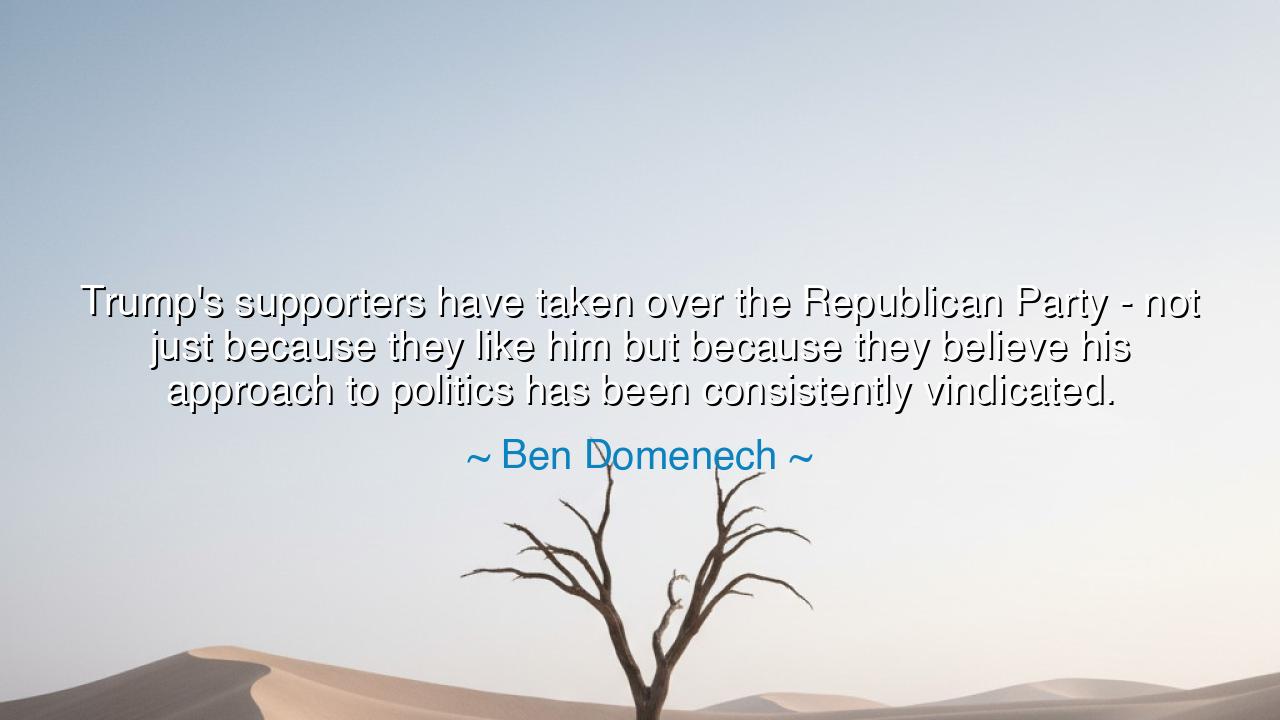
Trump's supporters have taken over the Republican Party - not
Trump's supporters have taken over the Republican Party - not just because they like him but because they believe his approach to politics has been consistently vindicated.






Power in politics flows not only from a single leader, but from the beliefs of the people who follow him. When Ben Domenech declared, “Trump's supporters have taken over the Republican Party - not just because they like him but because they believe his approach to politics has been consistently vindicated,” he revealed a truth as old as history itself: movements are born not merely from admiration, but from the conviction that a leader’s vision has proven itself in battle. It is belief, not mere affection, that reshapes the destiny of nations.
This quote speaks of a shift of power within a political order. Donald Trump did not only gather followers through personality or charm; he forged a bond with his supporters by showing them, through victories and defiance, that his way of confronting politics was effective. Each triumph—whether in elections, policies, or public debates—strengthened their conviction, turning a group of supporters into a dominant force capable of transforming the very identity of a long-standing party. In this way, they did not merely follow Trump—they became the party.
History offers many echoes of this transformation. Consider Julius Caesar, who began as a general commanding legions loyal to the Roman Republic. Through victories on the battlefield and bold defiance of the Senate, Caesar proved his method of leadership. His soldiers and the common people came to believe not just in him as a man, but in the rightness of his approach. In time, their loyalty overpowered Rome’s traditional institutions, reshaping its government into an empire. As with Trump’s supporters, belief forged through vindication became a weapon that toppled old hierarchies.
This dynamic reveals a profound truth about human nature. People may admire leaders from afar, but admiration alone fades like morning mist. When a leader’s strategy repeatedly brings visible success, admiration turns into faith, and faith becomes an unstoppable tide. Such belief can unify diverse groups, silencing internal divisions and creating a movement far greater than the leader himself. It is this collective force that ultimately takes hold of a party, a nation, or even an empire.
Yet, this power carries both promise and peril. If the leader’s vision is rooted in justice and the common good, the movement can bring renewal and prosperity. But if it is built on division or falsehood, the same fervor can plunge a nation into chaos. History reminds us that movements driven by deep belief are among the most powerful—and the most dangerous—forces in the world.
Let future generations learn from these words: politics is not merely the clash of ideas, but the rallying of faith. When people see their vision reflected and vindicated in action, they will rise together to claim the structures of power. This is how parties change, how nations shift, and how history itself is rewritten—by the unshakable belief of the many, forged through the deeds of the few.






PPPham Phi
There’s a governance angle I can’t shake. A movement can excel at mobilization yet struggle with coalition maintenance, staffing, and rule adherence. If a style gains power by breaking scripts, what happens when the script is running a bureaucracy or negotiating budgets? Which institutional skills are complementary to disruptive campaigning, and which are in tension? I’m looking for a neutral inventory of competencies that converts momentum into durable policy without burning through legitimacy.
Tthien
I’m wondering about narrative versus reality. Supporters often read every event as confirmation; critics read the same event as fluke or norm-breaking harm. How do we design tests that both sides would accept beforehand—predictive benchmarks, falsification criteria, or time-bound goals that aren’t retrofitted after the fact? I’d love examples of agreements that reduce motivated reasoning inside parties and media ecosystems, so “it worked” means more than likes, ratings, or vibes.
NCNguyen Chau
The takeover framing raises a representation question. If a party is steered by the most energized faction, how are minorities within that coalition heard—suburban moderates, business conservatives, libertarians, faith communities with differing priorities? What mechanisms preserve pluralism without paralyzing action: open primaries, proportional delegate rules, issue-based caucuses, or leadership slates that guarantee internal opposition a seat? I’d like a view on which reforms improve responsiveness versus merely laundering dominance with a veneer of process.
LVCharlie Bach Luu Viet
As a reader, I stumble on the word “vindicated.” What constitutes proof—electoral wins, policy outcomes, cultural salience, or durability over time? A strategy can capture attention yet fail at governing, or pass bills yet erode legitimacy. Could you sketch a nonpartisan scoreboard with weights for short-term mobilization, institutional competence, and long-run coalition growth? I’m also curious how to separate survivorship bias from genuine validation. What evidence would convince skeptics and, conversely, what signals should worry loyalists?